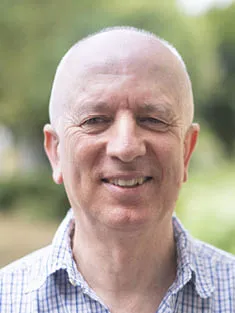Anthony Davis
Prize
Robert Robinson AwardYear
2020
Organisation
University of BristolCitation
For outstanding contributions to the design and synthesis of selective carbohydrate receptors with potential to improve the well-being of those with diabetes.

Molecules are the smallest objects that can possess complex shapes, and thus the smallest things that can be designed. Natural evolution designs molecules to perform many tasks, and these tend to be far cleverer and more effective than anything that can be made in a lab. Even so, Professor Davis and his team can try to match nature, and if their creations work well enough they can find medical applications.
A major goal of Professor Davis’ has been a molecule which binds glucose selectively under biological conditions. This could be used to help diabetics, either as a component in glucose monitors or as part of glucose-responsive insulin (insulin which becomes active only when needed). Recently, his team have found a good solution to this problem and are working with industry to develop applications. They have also made molecules which can bind chloride anions and carry them across cell membranes, and believe these agents could counteract the genetic defect which causes cystic fibrosis and could potentially be used as treatments for this condition.
Biography
Professor Anthony (Tony) Davis gained a BA in Chemistry from Oxford University in 1977, then stayed for a D.Phil. under Dr G. H. Whitham and two years’ postdoctoral work with Professor J. E. Baldwin. In 1981 he moved to the ETH Zürich as a Royal Society European Exchange Fellow working with Professor A. Eschenmoser. In 1982, he was appointed as a Lecturer in Organic Chemistry at Trinity College, Dublin. In September 2000 he moved to the University of Bristol, where he is Professor of Supramolecular Chemistry in the School of Chemistry. In 2002, Professor Davis was awarded the Tilden Medal from the Royal Society of Chemistry, and in 2015 the RSC Award for Physical Organic Chemistry. He is currently Chair of the Editorial Board of Organic and Biological Chemistry.
After some early work on synthetic methodology, especially the use of organosilicon reagents, the Davis group’s research has focused on supramolecular chemistry. A particular aim has been the design of functional molecules which are inspired by biology and are effective enough for use in biomedical settings. Two areas of special interest are biomimetic carbohydrate recognition and the binding and transport of inorganic anions. In the former, the group have published a series of synthetic receptors for the all-equatorial (glucose) family of carbohydrates, and most recently a highly effective receptor for glucose itself. This work has led to the foundation of two companies; Ziylo, which was sold in 2018 to Novo Nordisk, and Carbometrics, which continues to develop applications of Professor Davis’ systems.
It’s hugely motivating trying to do something that will reach beyond the academic world and have a real effect on peoples’ lives.
Professor Anthony Davis
Q&A with Professor Anthony Davis
What motivates you?
Trying to do something that will reach beyond the academic world and have a real effect on peoples’ lives.
What has been a highlight for you?
Our recent glucose receptor – first, seeing the design on the computer screen and feeling sure that it would work, and second, finding out that it really did work once it was made.
What is something you are looking forward to?
Seeing the glucose receptor applied in the real world, in glucose responsive insulin and/or glucose monitors.